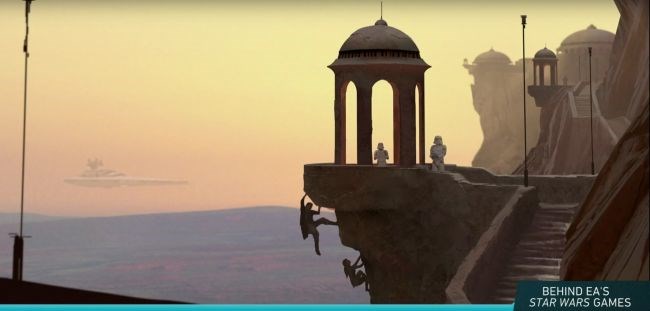Ex-Visceral employee calls the studio's closure 'a mercy killing'
An in-depth report on the end of Visceral and its Star Wars game portrays a project that was troubled from the start.

It was big, sad news when Electronic Arts closed Visceral Games and pulled the plug on the Amy Hennig-led Star Wars game it had in development. Fingers were quickly pointed at EA, which has a well-earned reputation for putting down perfectly healthy studios—and which former BioWare designer Manveer Heir said shortly after the shutdown is moving away from single-player games in favor of open worlds, because they're easier to monetize.
But as a very in-depth report from Kotaku makes clear, the situation was a lot more complicated than that. Visceral's Star Wars project, known internally as Ragtag (which you would think is more suitable for a Battlestar Galactica game, but I digress), got off to a rough start, even before it actually started. Dead Space 3 didn't meet expectations, which compelled the studio to take on Battlefield Hardline, seen by management as a relatively safe bet. A smaller part of the studio began work on an open-world pirate game code-named Jamaica, but that was canned and replaced by a "space scoundrel" Star Wars game called Yuma after EA made its exclusive videogame deal with Disney.
From there, according to the report, it wasn't so much a comedy of errors as a slow, sad decline, driven by indecision, indifference, and nervousness. Visceral was never given the staffing levels it needed to make the game, Hennig struggled without the support network she was accustomed to at Naughty Dog, the Frostbite engine was not suited to the design that had scoped, and EA's expectations were sky-high: One source told the site the publisher was looking for a 90 or higher score on Metacritic, an absolutely astronomical number even under the best of conditions.
The fact that it was a Star Wars project and not an original game like Uncharted made things worse, because it required iteration and consultation with Disney that could take months, even for small details. "With Uncharted, they can build any world they come up with, because it’s their world. With Star Wars you have to have that back and forth," a former Visceral employee said. "People think, ‘Oh it must be so cool to work on Star Wars.’ It actually kind of sucks."
The success of Star Wars Battlefront only made things worse. EA Motive was supposed to work with Visceral on Ragtag, but EA moved it to the single-player campaign of Battlefront 2 instead, while at the same time not allowing Visceral to hire any more employees. EA Vancouver was brought in to assist, but that led to a culture clash and conflict over territory and design. Progress was made, but ultimately not enough to save the game concept or the studio.
The whole thing can be summed up in a statement given by a former developer on Ragtag, who compared the game Hennig and Visceral were trying to make with what EA was actually looking for. "She was giving these massive presentations on the story, themes,” the developer said. “EA executives are like, 'FIFA Ultimate Team makes a billion dollars a year. Where’s your version of that?'"
It's clear that EA made some bad calls throughout the development of Ragtag, and there's obviously an aversion to narrative-heavy, one-and-done games like the one Visceral was working on. (Although why you'd bring in Amy Hennig to do anything else, I do not know.) But it's equally evident that, as surprising as it was for everyone, the cancellation of Ragtag (if not the closure of Visceral) was a long time coming: There were "dozens of perspectives" on whether or not the studio should have been closed, but many former employees said they couldn't see it ending any other way. As one put it, "It was a mercy killing."
The biggest gaming news, reviews and hardware deals
Keep up to date with the most important stories and the best deals, as picked by the PC Gamer team.
The full report on Visceral's closure goes deep into detail, and if you have any interest at all in how a sure-fire game project can go wrong it's well worth a read in full at Kotaku.

Andy has been gaming on PCs from the very beginning, starting as a youngster with text adventures and primitive action games on a cassette-based TRS80. From there he graduated to the glory days of Sierra Online adventures and Microprose sims, ran a local BBS, learned how to build PCs, and developed a longstanding love of RPGs, immersive sims, and shooters. He began writing videogame news in 2007 for The Escapist and somehow managed to avoid getting fired until 2014, when he joined the storied ranks of PC Gamer. He covers all aspects of the industry, from new game announcements and patch notes to legal disputes, Twitch beefs, esports, and Henry Cavill. Lots of Henry Cavill.

